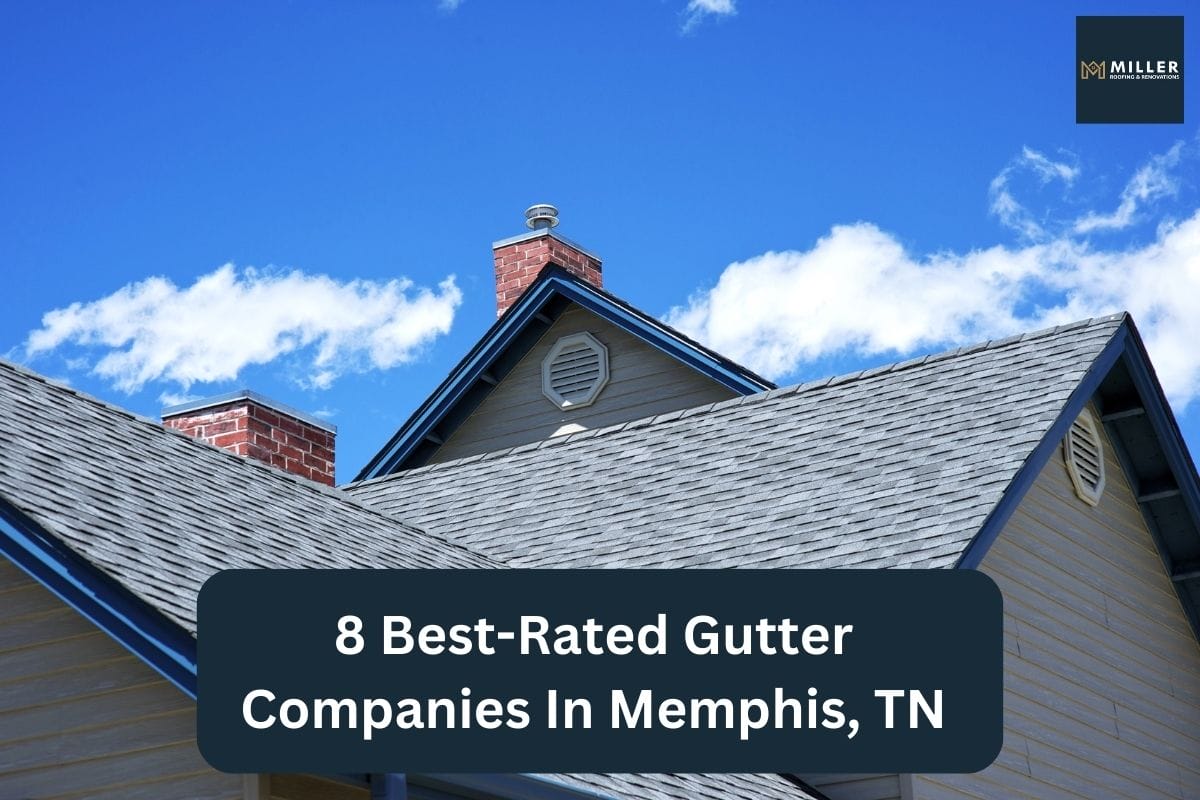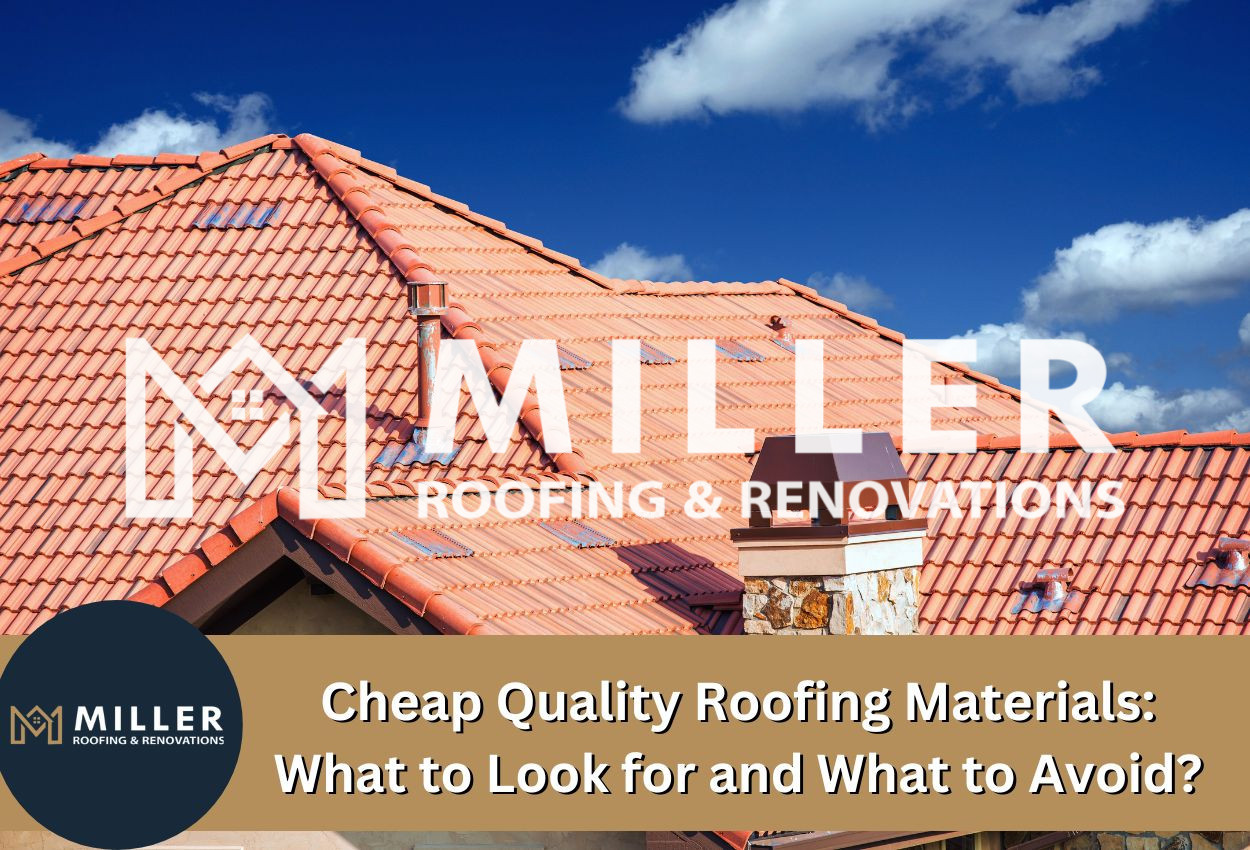
When it comes to installing a roof on your property, you don’t want to make a hasty decision on the type of roofing material you’re going to install. Instead, thorough research on different types of roofing materials will help you make the best choice for your building.
Choosing the right material for your roof is crucial, as different materials are better suited to various weather conditions. The roofing material you choose has a large impact on your home’s energy efficiency, durability, and overall performance. Factors such as local weather patterns, extreme temperatures, precipitation levels, and even environmental concerns should all be considered when making your decision.
At Miller Roofing and Renovations, we have helped many property owners choose and install the perfect roofing solution for their needs. We hope this guide offers you the information you need regarding different roofing materials, including their pros, cons, and costs, so you can find the right choice for your home.
*Please note that price ranges listed in this article may not reflect the final cost of your project. Prices are subject to change based on various factors such as local labor rates, material quality, and more. All costs established in this article are rough estimates based on average industry rates.
1. Asphalt Shingle Roofs
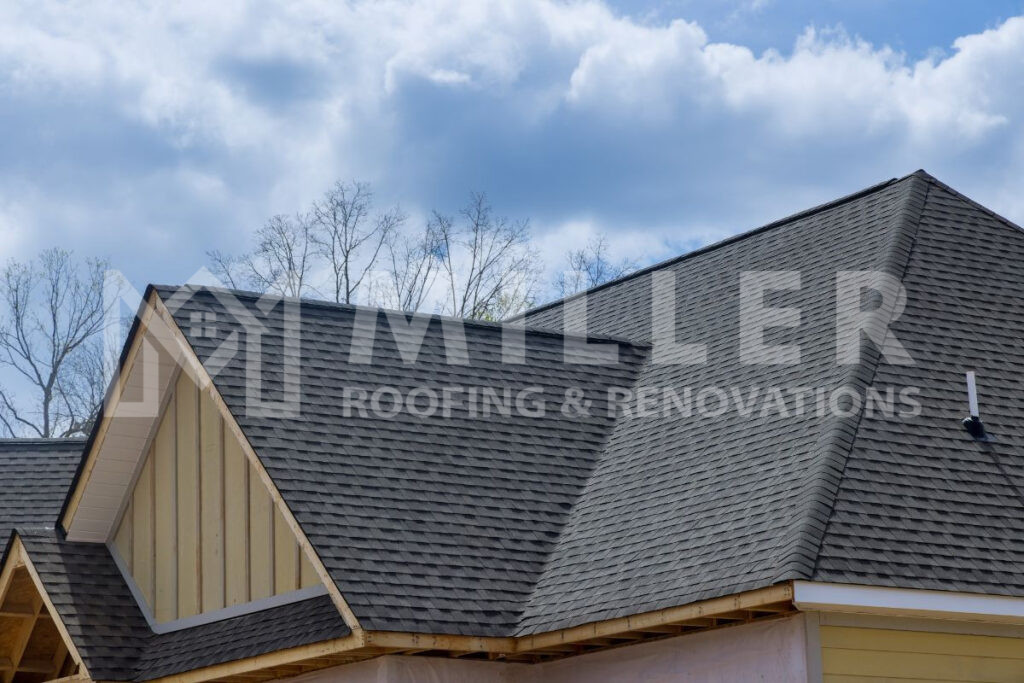
Cost: $4.25- $8.25 per sq. ft.
Asphalt shingles are one of the most widely chosen roofing materials across the country, with more than 75% of homes having them installed. They’re composed of a base mat covered in asphalt and small stones, allowing them to handle harsh weather. There are also three types you can choose from, such as 3-tab, architectural, and luxury shingles.
Pros: Asphalt shingles are affordable and budget-friendly. They’re easy to install and come in many colors and styles. They’re also suitable for various types of weather and can make any roof look nice.
Cons: They have a shorter lifespan of around 15 to 25 years and they require regular maintenance. Harsh weather can also easily damage them unless you choose impact, fire, or wind-resistant options.
Best Suited For: Homeowners looking for an affordable roofing option that works in most climates.
2. Metal Roofs
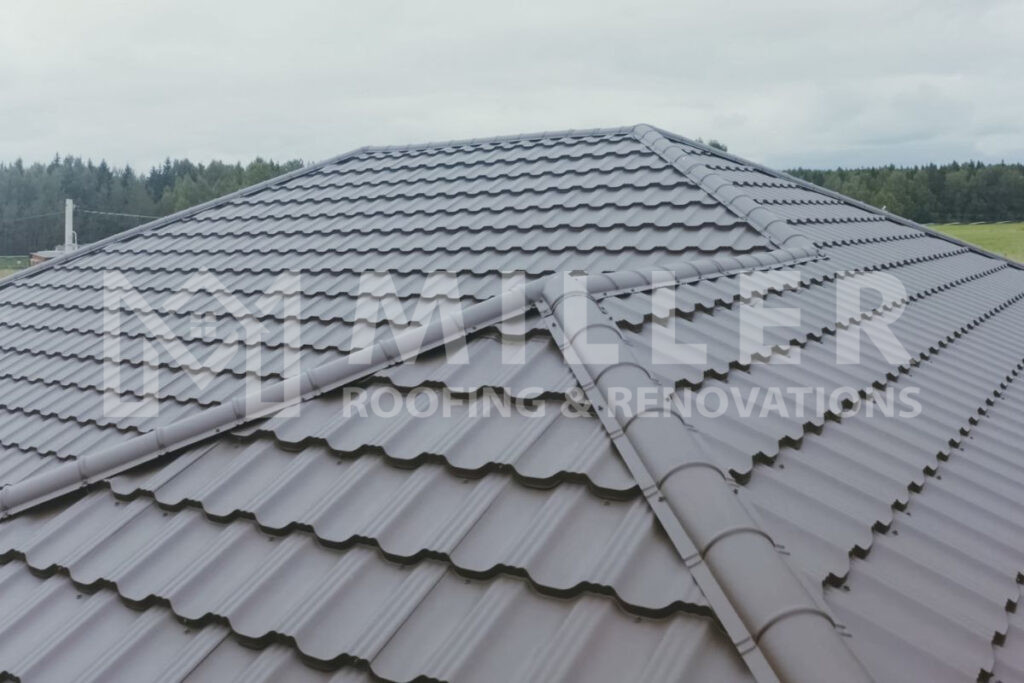
Cost: $9- $16 per sq. ft.
Metal roofs are becoming increasingly popular and can be made from steel, aluminum, or copper. They come in the form of standing seam or corrugated panels but can also be shaped into shingles, providing a modern appearance and excellent protection. Known for their durability, they last up to 50 years or more and are a top choice for both rural and urban areas across the country. Additionally, they are easy to clean and can come in any color to match your home’s style.
Pros: Metal roofs are extremely durable, and are also known to be one of the most energy-efficient roofing materials. Since they’re lightweight, they won’t put stress on your home’s structure either and are capable of withstanding extreme weather conditions.
Cons: Metal roofs cost more upfront than some other options. They can also be noisy during rain or hail, but insulation helps. Some metals might rust if they’re not cared for properly.
Best Suited For: Homeowners wanting a long-lasting, low-maintenance roof that can handle tough weather.
Also Read: How to Clean a Metal Roof (Easy Steps With Products)
3. Clay and Concrete Tiles
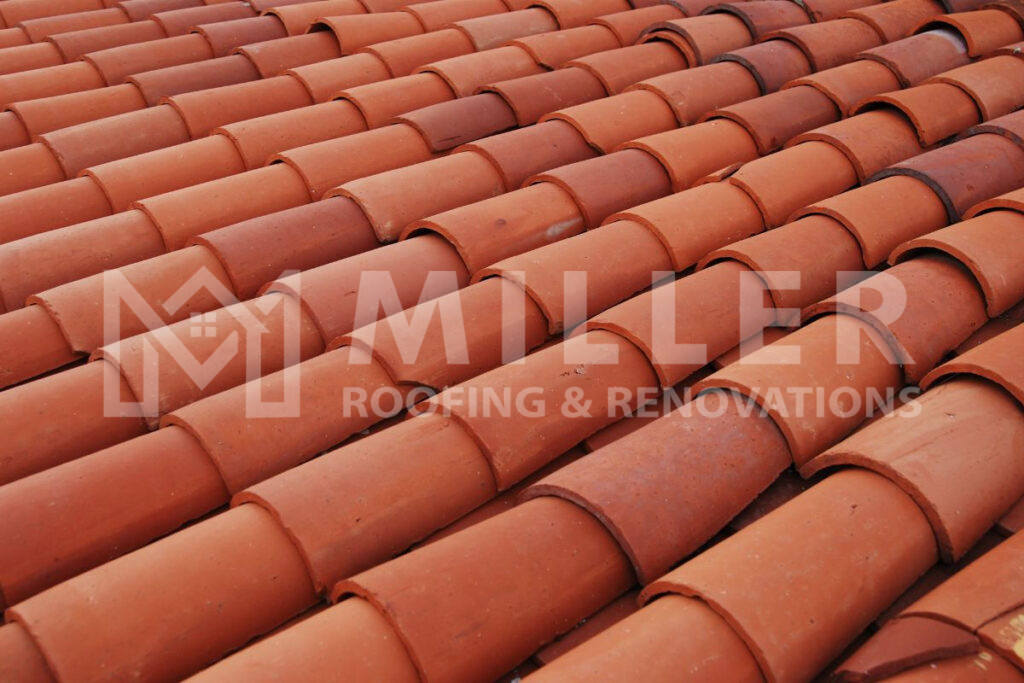
Cost: $7- $25 per sq. ft.
Clay and concrete tiles offer a classic look to any home but are best used to create a Mediterranean or Spanish-style appearance.
Pros: These types of tile are very durable, lasting 50 years or more, and are highly resistant to fire and rot.
Cons: Tile roofs are heavy and may require extra structural support prior to being installed. They’re also harder to install, requiring expertise and raising installation costs.
Best Suited For: Homes with a Mediterranean or Spanish style, especially in warm climates.
4. Slate Tiles
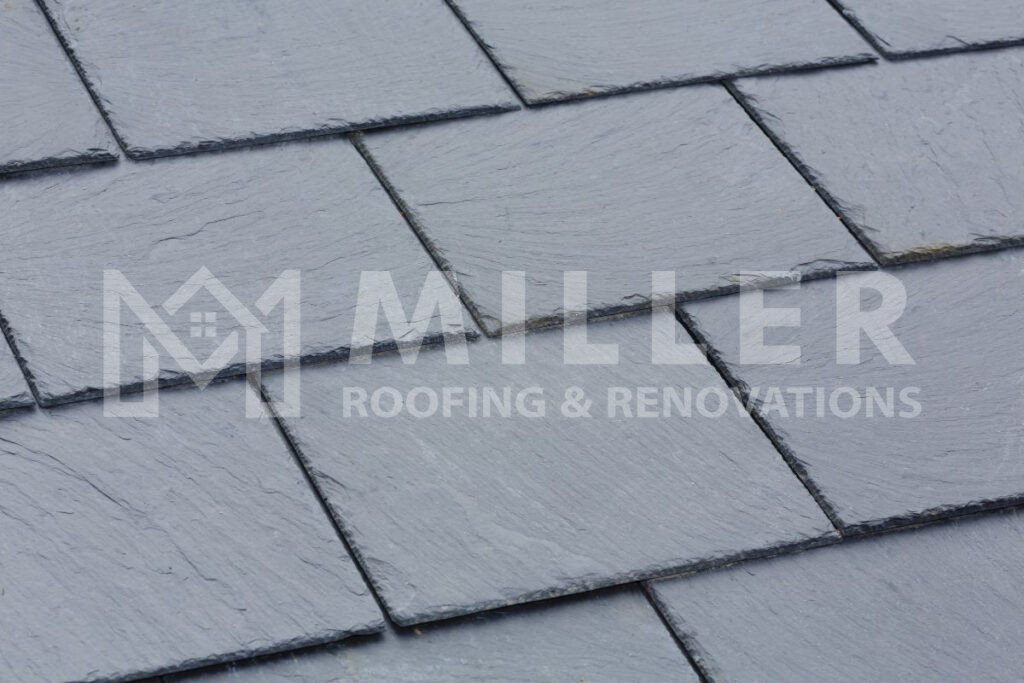
Cost: $4- $30 per sq. ft.
Slate tile is a natural stone roofing material known for its appearance and extended lifespan. It’s also one of the most durable types of roofing materials available.
Pros: Slate roofs can last 100 years or more, offering an elegant and natural appearance. These are highly resistant to weather and fire and can significantly increase your home’s value.
Cons: Like clay tile, slate is also very heavy and requires strong structural support. It is also the most expensive roofing option and needs to be installed by experts.
Best Suited For High-end homes and historic buildings where owners want a long-term investment.
5. Wood Shingles and Shakes
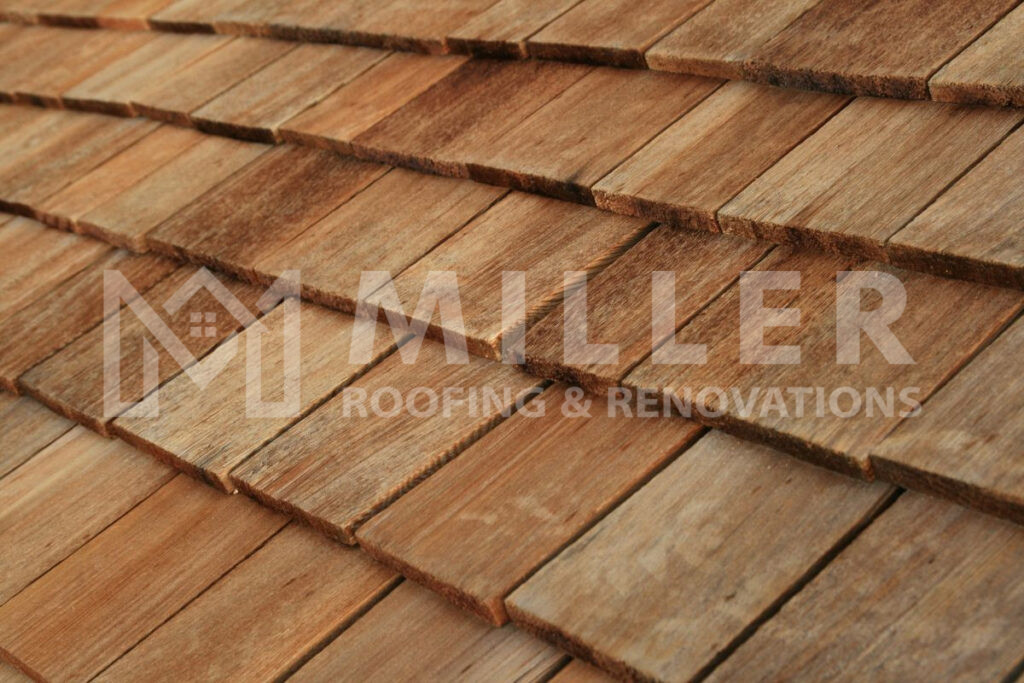
Cost: $4-$9.50 per sq. ft.
Wooden roofing materials provide homes with a natural, rustic look. Shingles are machine-cut while shakes are hand-split, both offering a unique appearance.
Pros: Wood roofs are beautiful and natural, providing excellent insulation. With proper care, they can last up to 30 years. They’re also one of the most eco-friendly roofing materials, loved by homeowners who want a green choice.
Cons: If not treated properly, wood shingles and shakes can catch fire easily, and be prone to mold and pest infestation. They require frequent maintenance in order to stay in good condition.
Best suited for Classic and rustic style homes in dry climates with low fire risk.
6. Synthetic/Composite Shingles
Cost: $6- $18 per sq. ft.
Synthetic shingles copy the look of natural materials while being more durable. They’re a more modern option among the different types of roofing materials you can purchase. These roofs offer great resistance from hail and storm damage.
Pros: Synthetic shingles look like wood or slate but are lighter and come at a lower price. They also need less maintenance than natural materials and are made from recycled plastics and rubbers.
Cons: Not as authentic as real wood or slate, and colors can fade over time.
Best Suited For: Homes that want the look of expensive materials without the price.
7. Rubber Roofs
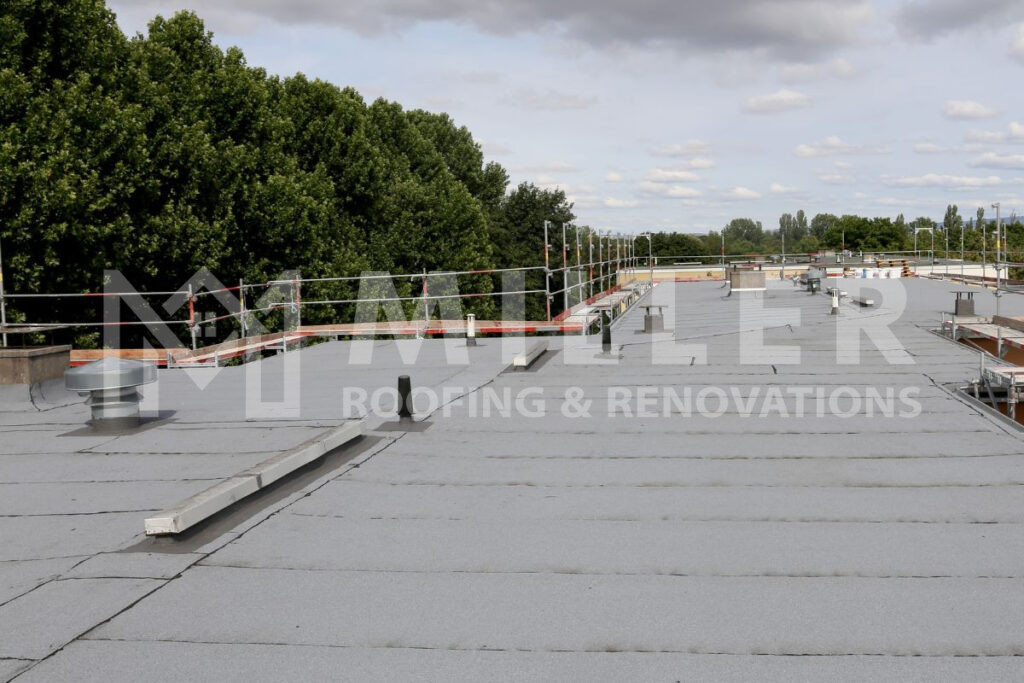
Cost: Click Here To Get A Custom Quote
Rubber roofing materials, including TPO, EPDM, and PVC, are generally installed on flat or low-sloped roofs. Each material has its own capabilities and limitations, but in general, these materials offer superior performance and durability to a roofing system.
Pros: Rubber roofing materials are tough and strong, and can withstand UV rays and extreme weather without degradation. EPDM is noted for flexibility and easy repair, and TPO and PVC’s light colors reflect sunlight, potentially lowering cooling costs.
Cons: Professional installation is often required, especially for TPO and PVC’s heat-welded seams. PVC can also become brittle in very cold climates, while TPO’s long-term performance is still being evaluated. Regular maintenance is necessary for the extended performance of these roofing materials.
Best Suited For: Flat or low-sloped roofs.
8. Built-Up Roofs
Cost: $5- $12 per sq. ft.
A built-up roof, also known as BUR, is a time-tested roofing system used primarily for flat or low-slope roofs. It’s made by layering alternating plies of reinforcing fabric and bitumen (asphalt) to create a tough, waterproof surface. The top layer is usually finished with gravel or a reflective coating for added protection.
Pros: Built-up roofing is extremely durable and can withstand harsh weather conditions. Its multiple layers provide excellent waterproofing and protection against UV rays. The gravel top layer also adds fire resistance and makes the roof more energy-efficient.
Cons: A BUR installation is labor-intensive and time-consuming, often leading to higher costs. The process also uses hot materials that emit strong odors, which can be disruptive. Despite its durability, BUR can crack in regions with significant temperature changes and its layered structure makes locating leaks challenging.
Best Suited For: Buildings with strong structure to support the added weight of the layers.
How To Choose The Right Roofing Material In Tennessee
If you’re trying to find a suitable roofing material for your home in Tennessee, there are certain factors that you should consider. For example, Tennessee receives around 50 to 60 storms a year, so choose roofing materials that will be able to withstand hurricane-force winds.
If you’re looking for a roof that can protect your home or property in the long run, choose materials like metal or slate that have a long lifespan. However, if you’re on a low budget, you can choose asphalt shingles, which will provide adequate protection for your property.
Don’t forget to check local building codes prior to making your choice, since they could determine which roofing materials are allowed by law in your city or town, or advise how these roofing materials need to be installed.
Call Miller Roofing and Renovations For A Professional Roof Replacement In Memphis, TN
If you are looking for reliable roof installation or replacement services in Memphis, and the nearby areas of TN, we are here to help! At Miller Roofing and Renovations, we aim to provide high-quality roofing services to homeowners in order to give them a roof and home that protects them for years to come.
Our skilled team of experienced roofers has successfully delivered satisfactory roof replacement services to many property owners in Tennessee. To learn more about our services, or for a free consultation, give us a call at (901) 457-9405.



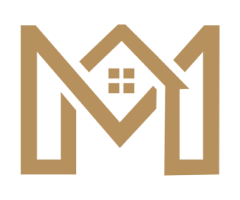 FREE ESTIMATE
FREE ESTIMATE

